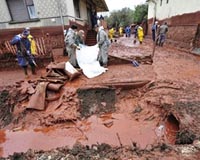| . |  |
. |
Manila (AFP) Oct 12, 2010 Asia is facing a worsening water crisis that threatens to curtail food production while taking an increasingly heavy toll on the region's economies, the Asian Development Bank said Tuesday. Governments, industries and people around the region urgently need to stop wasting so much of the precious resource if they are to limit the shortage, ADB infrastructure advisor Arjun Thapan said. "The water footprint in our towns and cities, in our irrigation systems, our energy production systems and in industry in general, is extravagant," Thapan said at a water crisis conference hosted by the Manila-based lender. "It needs to shrink and Asia needs to become acutely conscious of the scarcity value of its accessible fresh water, and the imperative of efficiency in managing it." In a report, the ADB faulted weak enforcement of laws for the degradation of Asian water quality, with between 80 and 89 percent of all untreated wastewater leaching into fresh water in east and south Asia, respectively. "In short, Asia is witnessing a despoliation of its freshwater resources with disastrous consequences for ecological balance and environmental sustainability," the bank said. It also highlighted that while irrigated agriculture uses up 80 percent of the region's fresh water, there have been only very minimal moves to boost irrigation efficiency over the past two decades. At least least nine billion dollars' worth of treated water was lost each year in Asia's cities, the ADB said. Climate change, rapid industrialisation, water pollution, dietary shifts and the drive to grow biofuels are also expected to deepen the water crisis, according to Thapan. On current trends, this would lead to a 40 percent gap between water demand and supply in Asia by 2030. "The impact is going to be greatest on food production and investment in the energy sector," Thapan told a news conference. "All of these, doubtless, is going to impact on overall economic growth." Among the region's largest countries, the ADB estimated India would face a water deficit of 50 percent by 2030 while China would have a shortage of 25 percent. China, India, Pakistan, Vietnam, Bangladesh, Nepal, Uzbekistan and Cambodia are currently feeling the heaviest impacts of the water shortage in terms of food and energy production as well as ecological damage, the ADB said. Plugging the water leakage and stopping the waste will cost billions of dollars, according to the ADB, which called on the private sector to play a bigger role in fixing the problem. "Increased investments from the private sector, especially in managing and delivering water services, and in using technology and innovation to reduce our water footprint, will be critical," Thapan said.
earlier related report The Intergovernmental Panel on Climate Change (IPCC) started a four-day session in the city of Busan with some 400 participants, including chairman Rajendra Pachauri and representatives and researchers from member countries, a Korea Meteorological Administration spokesman told AFP. The agenda for the closed meeting includes renewable energy sources, how to manage natural disasters and recommendations to reform the IPCC, the administration said in a statement last week. "The (reform) discussion is a very important agenda to determine the future directions of IPCC operations, and the result will receive great attention from the international community," said the statement. Pachauri and the IPCC came under criticism after the panel admitted its landmark 2007 report exaggerated the speed at which Himalayan glaciers were melting. The group admitted its mistakes but insisted its core conclusions about climate change were sound. A five-month probe ordered by UN Secretary General Ban Ki-Moon said the IPCC should have a stronger scientific basis for making its predictions and recommended an overhaul of the position of Pachauri. The controversy fanned debate in the scientific community on whether concerns over climate change are exaggerated. But the panel still has a role to "take action for adaptation to climate change" that is "getting more and more difficult to manage", South Korea's Environment Minister Lee Maan-Ee said in an opening speech. "I believe it is scientifically clear and commonly understood that climate change is unequivocal.... We cannot afford to dismiss this opportunity to build a green and sustainable world for future generations with countermeasures against climate change," he said. The group is expected to hold a press conference on Thursday after the discussions end. The UN panel, established in 1988, received the 2007 Nobel Peace Prize, along with former US Vice President Al Gore, for its contributions to the study of climate change.
Share This Article With Planet Earth
Related Links Water News - Science, Technology and Politics
 Hungary rushes to build dam in case of new toxic flood
Hungary rushes to build dam in case of new toxic floodKolontar, Hungary (AFP) Oct 10, 2010 Hungary raced against time Sunday to erect a dam around a ruptured reservoir and divert a new wave of toxic sludge that threatens to overwhelm already devastated villages. As hundreds of volunteers joined engineers rushing to erect the 600-metre dam, a top official said it was only a matter of days before the reservoir housing a chemical residue would begin to crumble. "In two or three d ... read more |
|
| The content herein, unless otherwise known to be public domain, are Copyright 1995-2010 - SpaceDaily. AFP and UPI Wire Stories are copyright Agence France-Presse and United Press International. ESA Portal Reports are copyright European Space Agency. All NASA sourced material is public domain. Additional copyrights may apply in whole or part to other bona fide parties. Advertising does not imply endorsement,agreement or approval of any opinions, statements or information provided by SpaceDaily on any Web page published or hosted by SpaceDaily. Privacy Statement |